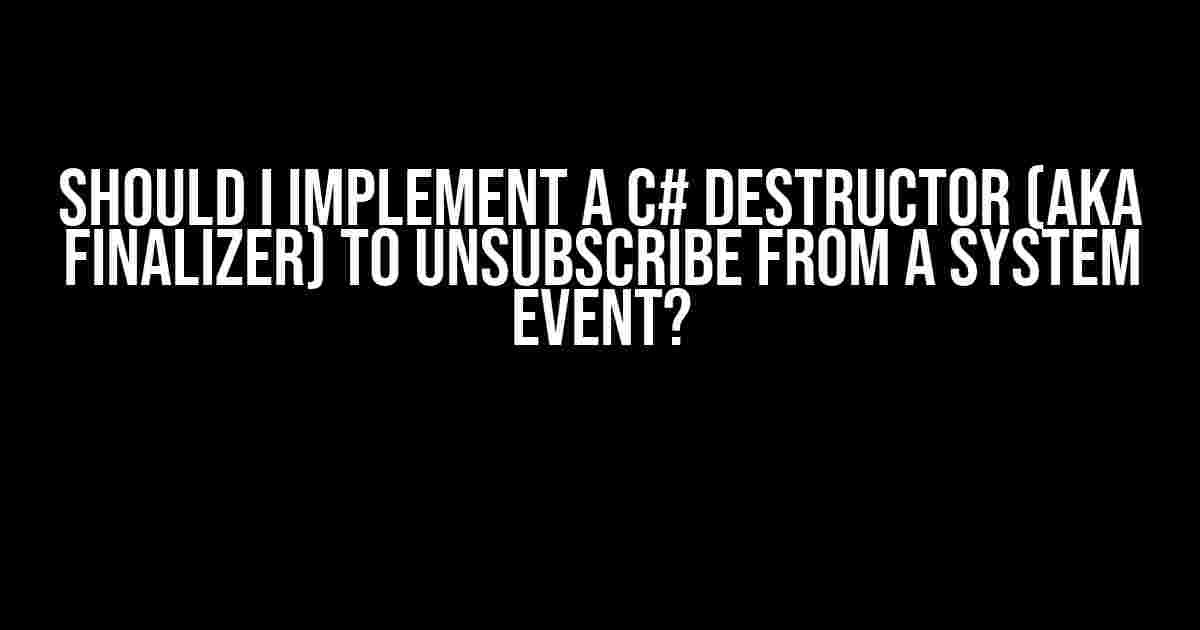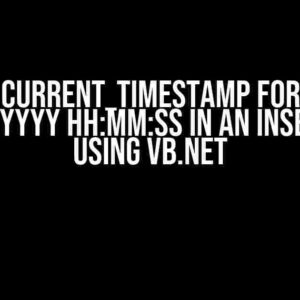Ah, the age-old question that has plagued many a C# developer! As you delve into the realm of event handling, you may find yourself wondering whether implementing a destructor, also known as a finalizer, is the solution to your subscription woes. But fear not, dear reader, for we shall embark on a journey to unravel the mysteries of C# destructors and their application in unsubscribing from system events.
The Lowdown on C# Destructors (Finalizers)
Before we dive into the nitty-gritty, let’s take a step back and understand what a C# destructor, or finalizer, really is. A finalizer is a special method in a class that is called just before the object is garbage collected. It’s a way to clean up resources, release memory, and perform any necessary actions before the object is destroyed.
public class MyClass
{
~MyClass()
{
// Finalizer code here
}
}Note that the tilde (~) symbol is used to denote the finalizer method.
Why You Should Avoid Using Finalizers (Mostly)
Now, you might be thinking, “Ah, perfect! I’ll just use a finalizer to unsubscribe from that pesky system event!” Not so fast, my friend! Finalizers can be problematic, and here’s why:
- Non-deterministic behavior**: Finalizers are called by the garbage collector, which means the exact timing of their execution is unpredictable. You can’t rely on a finalizer to unsubscribe from an event at a specific point in time.
- Performance overhead**: Finalizers can impede garbage collection, leading to performance issues and increased memory usage.
- Limited scope**: Finalizers can’t access other objects or resources that have already been garbage collected, making them less effective for cleanup tasks.
So, what’s the alternative? Well, that’s where the Dispose() method comes in!
The Dispose Pattern to the Rescue!
The Dispose() method is part of the IDisposable interface, which is designed to release unmanaged resources, such as file handles, network connections, and (you guessed it!) event subscriptions.
public class MyClass : IDisposable
{
public void Dispose()
{
// Unsubscribe from the system event here
SystemEvent -= MyEventHandler;
}
}The Dispose() method is called explicitly by the developer, ensuring deterministic behavior and allowing for more precise control over resource cleanup.
Putting it All Together: Unsubscribing from System Events
Now that we’ve covered the basics, let’s create a simple example to demonstrate how to unsubscribe from a system event using the Dispose() method.
public class SystemEventSubscriber : IDisposable
{
public event EventHandler SystemEvent;
public SystemEventSubscriber()
{
SystemEvent += MyEventHandler;
}
public void Dispose()
{
SystemEvent -= MyEventHandler;
}
private void MyEventHandler(object sender, EventArgs e)
{
// Handle the system event here
Console.WriteLine("System event handled!");
}
}In this example, we’ve created a Dispose() method is then used to unsubscribe from the event when the object is no longer needed.
Best Practices for Unsubscribing from System Events
Here are some guidelines to keep in mind when unsubscribing from system events:
- Use a dedicated method for unsubscribing**: Instead of relying on a finalizer, use a dedicated method like
Dispose()to unsubscribe from events. - Implement the IDisposable interface**: Make sure to implement the
IDisposableinterface to provide a clear indication that your class requires explicit disposal. - Unsubscribe in a deterministic manner**: Use the
Dispose()method to unsubscribe from events at a specific point in time, ensuring predictable behavior. - Avoid using finalizers for event unsubscribing**: Remember, finalizers are not reliable for unsubscribing from events and can lead to performance issues.
Conclusion
In conclusion, while C# destructors (finalizers) might seem like a convenient way to unsubscribe from system events, they’re not the most reliable or efficient solution. Instead, opt for the Dispose() method and the IDisposable interface to ensure deterministic behavior and proper resource cleanup. By following best practices and avoiding common pitfalls, you’ll be well on your way to handling system events like a pro!
| Scenario | Use Finalizer | Use Dispose() |
|---|---|---|
| Unsubscribing from system events | ||
| Cleaning up unmanaged resources | ||
| Releasing memory |
Note: indicates recommended approach, while indicates not recommended.
I hope this article has shed light on the mysterious world of C# destructors and event handling. Remember, when in doubt, reach for the Dispose() method and the IDisposable interface!
Frequently Asked Question
When it comes to event handling in C#, things can get a bit tricky. One common conundrum is whether to use a destructor (aka finalizer) to unsubscribe from a system event. Let’s dive into some frequently asked questions to get to the bottom of this!
Q: What’s the purpose of a finalizer (destructor) in C#?
A: The primary purpose of a finalizer is to release unmanaged resources, such as file handles or database connections, when an object is garbage collected. It’s not meant for managed resources like event subscriptions.
Q: Why shouldn’t I use a finalizer to unsubscribe from a system event?
A: Because finalizers are non-deterministic and can occur at any time, making it difficult to predict when the unsubscription will happen. Additionally, finalizers can introduce performance issues and even lead to unexpected behavior.
Q: How can I properly unsubscribe from a system event in C#?
A: You should unsubscribe from events in a deterministic manner, such as in the Dispose method (if you’re implementing IDisposable) or when the object is no longer needed. This ensures that the event is unsubscribed in a timely and predictable way.
Q: What are the consequences of not unsubscribing from a system event?
A: Failing to unsubscribe from an event can lead to memory leaks, as the event handler will keep a reference to the object, preventing it from being garbage collected. This can cause performance issues and even crashes.
Q: Are there any scenarios where using a finalizer to unsubscribe from an event might be acceptable?
A: While generally not recommended, it might be acceptable in rare cases where the object is very short-lived and the event subscription is only used for a brief period. However, this should be carefully considered and thoroughly tested to avoid potential issues.



